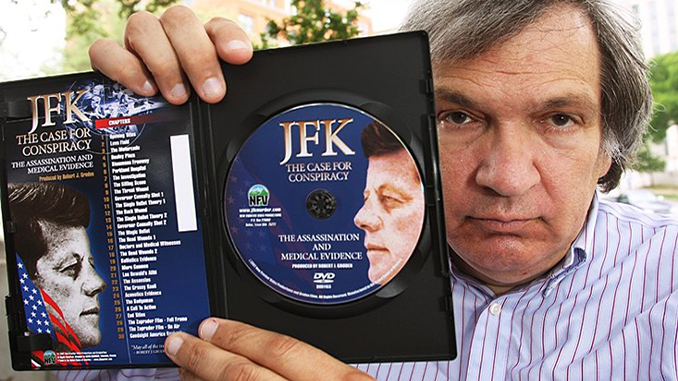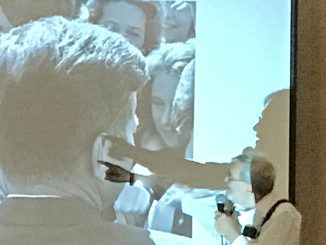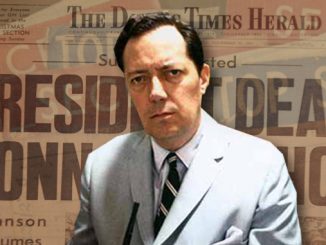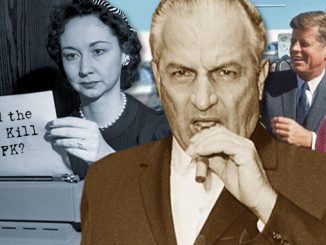
Longtime researcher Robert Groden, who saved the Zapruder film from the dustbin of history, received a lifetime achievement award for his JFK research.
By S.T. Patrick
At the recent 5th Annual JFK Assassination Conference in Dallas, veteran researcher Robert Groden—the man who single-handedly saved the famous Zapruder film from the dustbin of history—was given the Garrison-Lane Lifetime Achievement Award for JFK Research.
Groden is considered one of the leading first-generation researchers—researchers who began their work between the day of the assassination in 1963 and the end of the Lyndon Johnson administration in 1968. Groden turned 18 on the day President John F. Kennedy was shot in Dealey Plaza. His work began shortly thereafter.
“Within days, actually, before the [assassination] week was out,” Groden said, “I was already archiving everything I could find and reading everything I could find . . . being fascinated by the fact that the assassination itself had been filmed . . . not by one, not by two, but actually by five different people. I was intrigued as to why these films were all being hidden from public view.”
Groden would be the catalyst behind the effort to show the most famous film of the assassination to the public. As a photo-optics technician for a New York City motion picture processing lab, he was on staff when Life magazine contracted with the lab to convert the 26-second Zapruder film from 8mm to 35mm.
“As we did it, let’s just say an extra copy was made that Life didn’t know about,” Groden slyly stated. “It became the most important 26 seconds of history ever photographed.”
Fearing legal ramifications and attempts on his life, Groden kept the film private for several years. “There was a conspiracy to kill the president, and I was the only one who could prove it,” he said.
Groden, at the behest of the few researchers for whom he had screened the Zapruder film, showed the film at a Georgetown University symposium but to little national fanfare. Attending the next screening in Boston, however, was comedian-activist Dick Gregory, who urged Groden to show the film to the Rockefeller Commission in 1975. Groden and Steve Jaffe, one of Jim Garrison’s investigators, testified to the commission about CIA excesses and activities related to the JFK assassination. More importantly, Groden projected the Zapruder film for the commission.
While Groden was testifying in Washington, D.C., he received a call from Geraldo Rivera’s “Good Night America” staff. On March 6, 1975, Groden and Gregory appeared on Rivera’s ABC program to show the Zapruder film to the nation.
Within days, Groden was called to testify before the newly formed House Select Committee on Assassinations (HSCA). He served as a photographic consultant for the HSCA, who in 1978 issued their final report, which stated that Kennedy was probably murdered as a result of a conspiracy.
The award given to Groden was named after New Orleans District Attorney Jim Garrison and author and attorney Mark Lane. Garrison, whose case was dramatized in Oliver Stone’s 1991 film “JFK,” was the only government official to prosecute a case against those he believed were responsible for the murder.
Lane, an attorney who also became one of the leading early researchers in the case, published a critical article in the National Guardian four weeks after the assassination. Lane was also instrumental in setting up American Free Press in August 2001, serving as the newspaper’s corporate attorney for years. Garrison lost the case against New Orleans businessman Clay Shaw in 1969, but he wrote two seminal works on the case, A Heritage of Stone (1970) and On the Trail of the Assassins (1988). Lane’s 1966 book Rush to Judgment became the first widely popular work critical of the Warren Commission, the group set up by President Lyndon Johnson to create an official report on the Kennedy assassination.
Gary Fannin, the author of The Innocence of Oswald and member of the conference board that awarded Groden, called Garrison and Lane the “first two real heroes of the case.” Fannin also emphasized Groden’s importance, noting, “If it weren’t for Garrison, Lane, and Groden, a lot of [the assassination research] would never have been available.”
Lane is best known for his JFK assassination books, which also include A Citizen’s Dissent (1968), Plausible Denial (1991), and Last Word (2011), but Fannin pointed out that Lane should also be lauded for attempting, at the request of Marguerite Oswald, to represent Lee Harvey Oswald, her son, to the Warren Commission. It was this representation that the Warren Commission rejected.
The original publishing of Rush to Judgment became legendary among JFK researchers. Sixteen publishers cancelled contracts with Lane to publish it. Lane had to take the book to Europe to be published and was only paid $1,500 for writing what became a global phenomenon. Rush to Judgment became a No. 1 best seller that spent 29 weeks on the New York Times bestseller list.
Groden today can be found outside the Texas School Book Depository in Dealey Plaza on weekends. For 25 years, he has sold books, DVDs, and magazines that he has produced over the life of his research. He answers any and all questions from those researchers and assassination buffs who have made the trek to Dealey Plaza. At 72, he remains the most public and accessible of all the researchers. He also remains the most harassed by local Dallas officials. Groden has been ticketed 84 times for doing commerce in Dealey Plaza, all of which have been thrown out of court. He has been arrested and jailed twice.
“The lie pays more than the truth,” Fannin said. For Groden, there were personal sacrifices and missed professional opportunities that continue to impact his life today. But like Garrison and Lane, Groden is a vital member of an elite group of JFK assassination research figures who have changed the way Americans view the case.
S.T. Patrick holds degrees in both journalism and social studies education. He spent ten years as an educator and now hosts the “Midnight Writer” News Show. His email is [email protected].






Robert Groden is one of many heroes for having the courage to expose the truth to Americans! I agree that the JFK assassination was a conspiracy and that it had multiple shooters, one of whom was Roscoe White, and that Lee Oswald was a patsy and never fired a shot at Kennedy. He also never fired at General Edwin Walker and did not kill Officer J.D Tippit. Oswald was also an agent for the government and a hero trying to save the President. There are so many groups and reasons that contributed to Kennedy’s death, but overall, he was taking us to world peace and the government and others did not like that. And so they killed him and framed and silenced one of their own assets, using their mob asset Jack Ruby, later killing him and many others who knew too much.